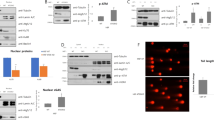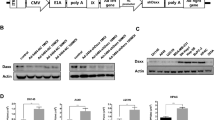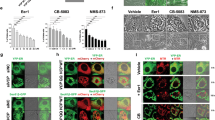Abstract
Oncolytic adenoviruses, such as Delta-24-RGD (Δ24RGD), are replication-competent viruses that are genetically engineered to induce selective cancer cell lysis. In cancer cells, Δ24RGD induces massive autophagy, which is required for efficient cell lysis and adenoviral spread. Understanding the cellular mechanisms underlying the regulation of autophagy in cells treated with oncolytic adenoviruses may provide new avenues to improve the therapeutic effect. In this work, we showed that cancer cells infected with Δ24RGDundergo autophagy despite the concurrent activation of the AKT/mTOR pathway. Moreover, adenovirus replication induced sustained activation of JNK proteins in vitro. ERK1/2 phosphorylation remained unchanged during adenoviral infection, suggesting specificity of JNK activation. Using genetic ablation and pharmacological inactivation of JNK, we unequivocally demonstrated that cells infected with Δ24RGD required JNK activation. Thus, genetic co-ablation of JNK1 and JNK2 genes or inhibition of JNK kinase function rendered Δ24RGD–treated cells resistant to autophagy. Accordingly, JNK activation induced phosphorylation of Bcl-2 and prevented the formation of Bcl-2/Beclin 1 autophagy suppressor complexes. Using an orthotopic model of human glioma xenograft, we showed that treatment with Δ24RGD induced phosphorylation and nuclear translocation of JNK, as well as phosphorylation of Bcl-2. Collectively, our data identified JNK proteins as an essential mechanistic link between Δ24RGD infection and autophagy in cancer cells. Activation of JNK without inactivation of the AKT/mTOR pathway constitutes a distinct molecular signature of autophagy regulation that differentiates Δ24RGD adenovirus from the mechanism used by other oncolytic viruses to induce autophagy and provides a new rationale for the combination of oncolytic viruses and chemotherapy.
This is a preview of subscription content, access via your institution
Access options
Subscribe to this journal
Receive 50 print issues and online access
$259.00 per year
only $5.18 per issue
Buy this article
- Purchase on Springer Link
- Instant access to full article PDF
Prices may be subject to local taxes which are calculated during checkout




Similar content being viewed by others
References
Russell SJ, Peng KW, Bell JC . Oncolytic virotherapy. Nat Biotechnol 2012; 30: 658–670.
Fueyo J, Alemany R, Gomez-Manzano C, Fuller GN, Khan A, Conrad CA et al. Preclinical characterization of the antiglioma activity of a tropism-enhanced adenovirus targeted to the retinoblastoma pathway. J Natl Cancer Inst 2003; 95: 652–660.
Ito H, Aoki H, Kuhnel F, Kondo Y, Kubicka S, Wirth T et al. Autophagic cell death of malignant glioma cells induced by a conditionally replicating adenovirus. J Natl Cancer Inst 2006; 98: 625–636.
Piya S, White EJ, Klein SR, Jiang H, McDonnell TJ, Gomez-Manzano C et al. The E1B19K oncoprotein complexes with Beclin 1 to regulate autophagy in adenovirus-infected cells. PLoS ONE 2011; 6: e29467.
Jiang H, White EJ, Rios-Vicil CI, Xu J, Gomez-Manzano C, Fueyo J . Human adenovirus type 5 induces cell lysis through autophagy and autophagy-triggered caspase activity. J Virol 2011; 85: 4720–4729.
Inoki K, Li Y, Zhu T, Wu J, Guan KL . TSC2 is phosphorylated and inhibited by Akt and suppresses mTOR signalling. Nat Cell Biol 2002; 4: 648–657.
Inoki K, Zhu T, Guan KL . TSC2 mediates cellular energy response to control cell growth and survival. Cell 2003; 115: 577–590.
Kim J, Kundu M, Viollet B, Guan KL . AMPK and mTOR regulate autophagy through direct phosphorylation of Ulk1. Nat Cell Biol 2011; 13: 132–141.
Kumar SH, Rangarajan A . Simian virus 40 small T antigen activates AMPK and triggers autophagy to protect cancer cells from nutrient deprivation. J Virol 2009; 83: 8565–8574.
Shelly S, Lukinova N, Bambina S, Berman A, Cherry S . Autophagy is an essential component of Drosophila immunity against vesicular stomatitis virus. Immunity 2009; 30: 588–598.
Wei Y, Pattingre S, Sinha S, Bassik M, Levine B . JNK1-mediated phosphorylation of Bcl-2 regulates starvation-induced autophagy. Mol Cell 2008; 30: 678–688.
Xu P, Das M, Reilly J, Davis RJ . JNK regulates FoxO-dependent autophagy in neurons. Genes Dev 2011; 25: 310–322.
Oberstein A, Jeffrey PD, Shi Y . Crystal structure of the Bcl-XL-Beclin 1 peptide complex: Beclin 1 is a novel BH3-only protein. J Biol Chem 2007; 282: 13123–13132.
Liang XH, Kleeman LK, Jiang HH, Gordon G, Goldman JE, Berry G et al. Protection against fatal Sindbis virus encephalitis by beclin, a novel Bcl-2-interacting protein. J Virol 1998; 72: 8586–8596.
Liu TC, Galanis E, Kirn D . Clinical trial results with oncolytic virotherapy: a century of promise, a decade of progress. Nat Clin Pract Oncol 2007; 4: 101–117.
Wang J, Whiteman MW, Lian H, Wang G, Singh A, Huang D et al. A non-canonical MEK/ERK signaling pathway regulates autophagy via regulating Beclin 1. J Biol Chem 2009; 284: 21412–21424.
Kudchodkar SB, Yu Y, Maguire TG, Alwine JC . Human cytomegalovirus infection induces rapamycin-insensitive phosphorylation of downstream effectors of mTOR kinase. J Virol 2004; 78: 11030–11039.
Gingras AC, Raught B, Sonenberg N . mTOR signaling to translation. Curr Top Microbiol Immunol 2004; 279: 169–197.
Shertz CA, Cardenas ME . Exploiting and subverting Tor signaling in the pathogenesis of fungi, parasites, and viruses. PLoS Pathog 2011; 7: e1002269.
Hung CH, Chen LW, Wang WH, Chang PJ, Chiu YF, Hung CC et al. Regulation of autophagic activation by Rta of Epstein-Barr virus via ERK-kinase pathway. J Virol 2014; 88: 12133–12145.
Fueyo J, Gomez-Manzano C, Alemany R, Lee PS, McDonnell TJ, Mitlianga P et al. A mutant oncolytic adenovirus targeting the Rb pathway produces anti-glioma effect in vivo. Oncogene 2000; 19: 2–12.
He B . Viruses, endoplasmic reticulum stress, and interferon responses. Cell Death Differ 2006; 13: 393–403.
Li XD, Lankinen H, Putkuri N, Vapalahti O, Vaheri A . Tula hantavirus triggers pro-apoptotic signals of ER stress in Vero E6 cells. Virology 2005; 333: 180–189.
Ogata M, Hino S, Saito A, Morikawa K, Kondo S, Kanemoto S et al. Autophagy is activated for cell survival after endoplasmic reticulum stress. Mol Cell Biol 2006; 26: 9220–9231.
Orvedahl A, Alexander D, Talloczy Z, Sun Q, Wei Y, Zhang W et al. HSV-1 ICP34.5 confers neurovirulence by targeting the Beclin 1 autophagy protein. Cell Host Microbe 2007; 1: 23–35.
Bennett BL, Sasaki DT, Murray BW, O'Leary EC, Sakata ST, Xu W et al. SP600125, an anthrapyrazolone inhibitor of Jun N-terminal kinase. Proc Natl Acad Sci USA 2001; 98: 13681–13686.
Gupta S, Barrett T, Whitmarsh AJ, Cavanagh J, Sluss HK, Derijard B et al. Selective interaction of JNK protein kinase isoforms with transcription factors. EMBO J 1996; 15: 2760–2770.
Martin JH, Mohit AA, Miller CA . Developmental expression in the mouse nervous system of the p493F12 SAP kinase. Brain Res Mol Brain Res 1996; 35: 47–57.
Kirkin V, McEwan DG, Novak I, Dikic I . A role for ubiquitin in selective autophagy. Mol Cell 2009; 34: 259–269.
Klionsky DJ, Emr SD . Autophagy as a regulated pathway of cellular degradation. Science 2000; 290: 1717–1721.
Bode AM, Dong Z . The functional contrariety of JNK. Mol Carcinog 2007; 46: 591–598.
Alonso MM, Jiang H, Yokoyama T, Xu J, Bekele NB, Lang FF et al. Delta-24-RGD in combination with RAD001 induces enhanced anti-glioma effect via autophagic cell death. Mol Ther 2008; 16: 487–493.
Eyre TA, Collins GP, Goldstone AH, Cwynarski K . Time now to TORC the TORC? New developments in mTOR pathway inhibition in lymphoid malignancies. Br J Haematol 2014; 166: 336–351.
Gibson S, Widmann C, Johnson GL . Differential involvement of MEK kinase 1 (MEKK1) in the induction of apoptosis in response to microtubule-targeted drugs versus DNA damaging agents. J Biol Chem 1999; 274: 10916–10922.
Wang W, Wang YQ, Meng T, Yi JM, Huan XJ, Ma LP et al. MCL-1 degradation mediated by JNK activation via MEKK1/TAK1-MKK4 contributes to anticancer activity of new tubulin inhibitor MT189. Mol Cancer Ther 2014; 13: 1480–1491.
Arthur JS, Ley SC . Mitogen-activated protein kinases in innate immunity. Nat Rev Immunol 2013; 13: 679–692.
Mizushima N, Levine B, Cuervo AM, Klionsky DJ . Autophagy fights disease through cellular self-digestion. Nature 2008; 451: 1069–1075.
Dong X, Levine B . Autophagy and viruses: adversaries or allies? J Innate Immun 2013; 5: 480–493.
Orvedahl A, Levine B . Viral evasion of autophagy. Autophagy 2008; 4: 280–285.
Wileman T . Aggresomes and autophagy generate sites for virus replication. Science 2006; 312: 875–878.
Chen L, Chen D, Gong M, Na M, Li L, Wu H et al. Concomitant use of Ad5/35 chimeric oncolytic adenovirus with TRAIL gene and taxol produces synergistic cytotoxicity in gastric cancer cells. Cancer Lett 2009; 284: 141–148.
Ingemarsdotter CK, Baird SK, Connell CM, Oberg D, Hallden G, McNeish IA . Low-dose paclitaxel synergizes with oncolytic adenoviruses via mitotic slippage and apoptosis in ovarian cancer. Oncogene 2010; 29: 6051–6063.
Acknowledgements
We thank Tamara Locke (Department of Scientific Publications, The University of Texas MD Anderson Cancer Center) for editorial assistance. This work was supported by grants from the NHI/NCI (P50CA127001; Cancer Center Support Grant P30CA016672—High Resolution Electron Microscopy and Research Animal Support Facilities), the Marnie Rose Foundation, the Will Power Foundation, the Schissler Foundation and the American Legion Auxiliary.
Author information
Authors and Affiliations
Corresponding author
Ethics declarations
Competing interests
Dr Fueyo and Dr Gomez-Manzano are funders of DNAtrix Inc., a company with interest in the clinical development of Delta-24-RGD as a therapeutic tool.
Additional information
Supplementary Information accompanies this paper on the Oncogene website
Rights and permissions
About this article
Cite this article
Klein, S., Piya, S., Lu, Z. et al. C-Jun N-terminal kinases are required for oncolytic adenovirus-mediated autophagy. Oncogene 34, 5295–5301 (2015). https://doi.org/10.1038/onc.2014.452
Received:
Revised:
Accepted:
Published:
Issue Date:
DOI: https://doi.org/10.1038/onc.2014.452
This article is cited by
-
Engineered bacterial outer membrane vesicles encapsulating oncolytic adenoviruses enhance the efficacy of cancer virotherapy by augmenting tumor cell autophagy
Nature Communications (2023)
-
Mitophagy and reactive oxygen species interplay in Parkinson’s disease
npj Parkinson's Disease (2022)
-
AKT and JUN are differentially activated in mesenchymal stem cells after infection with human and canine oncolytic adenoviruses
Cancer Gene Therapy (2021)
-
Oncolytic virotherapy reverses chemoresistance in osteosarcoma by suppressing MDR1 expression
Cancer Chemotherapy and Pharmacology (2021)
-
Autophagy and cancer stem cells: molecular mechanisms and therapeutic applications
Cell Death & Differentiation (2019)



